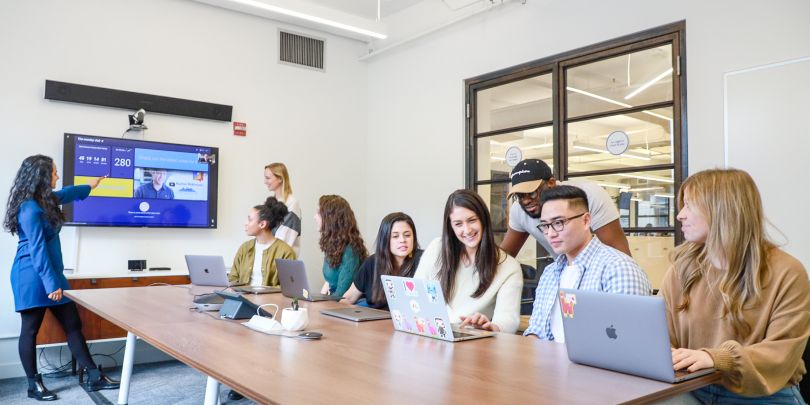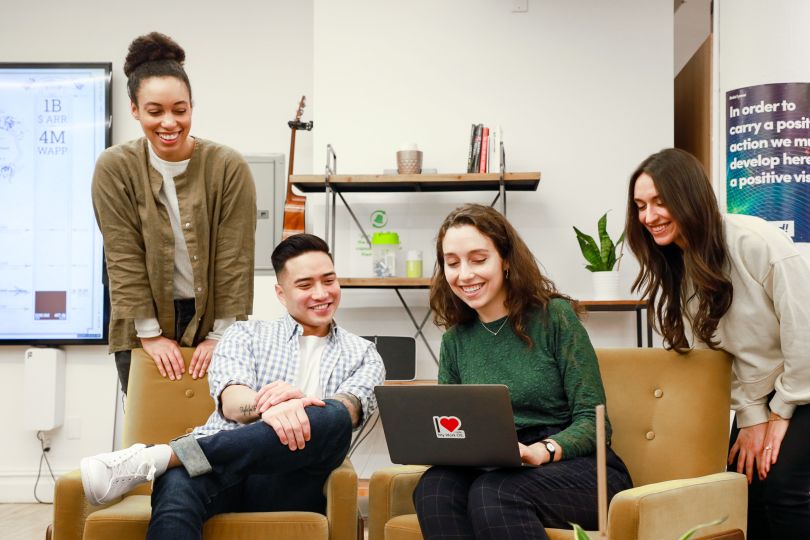In Dan Millman’s 1980 book, “The Way of the Peaceful Warrior,” a fictional character named Socrates insists that “the secret to change is to focus all of your energy not on fighting the old, but on building the new.”
When it comes to social impact, this quote not only relates to the new processes that tech companies can use in their partnerships with nonprofits, but also the strategies that can help narrow the digital divide, or the gap between those who benefit from the Information Age and those who do not.
Specifically, the digital divide affects both underprivileged members of society and the nonprofits that are trying to help them. Thankfully, altruistic companies like monday.com — a platform for work management software — are taking steps to make a social impact through the accessibility of their product.
“We previously offered a discount for our services, but the pricing could still be too high for small nonprofits,” said Social Impact Manager Lauren Rosalanko. “With our new initiative, I’ve received emails from nonprofits that are full of gratitude and even disbelief.”
Like Dan Millman’s Socrates suggested, monday.com is building on the new by creating fresh initiatives and sharing technology that would otherwise have been financially out of reach. The result is a level of collaboration and effectiveness between monday.com and their nonprofit partners that reaches inspiring new heights. To learn more, we sat down with Rosalanko for an extended conversation.

Why did you connect so strongly with the social impact team and its initiatives?
I’ve been involved with nonprofits since I was a teenager, specifically with animal shelters and animal rescue. I’m currently a kitten foster mom for an organization in New York — over the past six years I’ve fostered over 50 cats and kittens! I realized I could continue to make an impact beyond volunteering outside of work.
When I started taking on nonprofit projects at monday.com in 2019, there wasn’t an official social impact team, though I knew there were more opportunities to do good. When the opportunity came to join the first social impact team at monday.com, I immediately embraced it and transitioned from customer experience manager to the new role. Not only was the role aligned with my passion, but I also had the ability to continue growing and take on new challenges in an undefined position.
Our overall mission is to help nonprofit teams to close the digital divide through our product, monetary donations and employee volunteer time.”
What does the social impact team do at monday.com?
Our social impact team created the Equal Impact Initiative, which includes three pillars: one hundred percent product (for every $1 of revenue, we are committed to offering up to $1 worth of monday.com subscriptions to nonprofit teams); 10 percent equity (2 percent reserved prior to the IPO and the remaining 8 percent will be donated gradually with an annual cap of 1 percent); and 1 percent time (employees can volunteer 1 percent of their paid work time to support nonprofit organizations).
Our overall mission is to help nonprofit teams to close the digital divide through our product, monetary donations and employee volunteer time. We were able to create our social impact team with a focus on assisting nonprofit teams in taking away the cost barrier of using monday.com by offering our plan for free or deeply discounted prices and also focusing on skills-based volunteering directed at helping nonprofit teams onboard to monday.com.
Tell a story about a memorable event the social impact team was involved in — and what you think the impact was for both the community and the team.
Before we were officially a team, my co-worker Rotem Sela led an initiative to donate monday.com’s March 2020 travel budget to organizations in New York and Israel that were most impacted by the initial onset of Covid-19. Rotem created a team of individuals from three different groups in Tel Aviv and New York to collaborate on this project.
Being able to work directly with organizations on a project that went from an idea to reality in a few short weeks showed me the power of monday.com’s resources, dedicated staff and innovative thinking when it came to social impact. It also showed the company’s commitment to repurposing funds that couldn’t be used to help organizations in cities where our offices are located, like Tel Aviv and New York City.
This project reminded me of a favorite quote attributed to Margaret Mead: “Never doubt that a small group of thoughtful committed individuals can change the world. In fact, it’s the only thing that ever has.”
Why is social impact important to monday.com?
People at every level of our organization — from our CEOs to our individual contributors — care about doing good first and foremost. While individual employees can create their own impact outside of work, if we can also come together to donate our product licenses, product knowledge and the other resources we have as a growing company, we can impact others even more.
What initiatives or events would you like the social impact team to be involved in the future?
We are currently in the process of hiring a humanitarian emergency manager in our Tel Aviv office. The goal of this role will be to respond to emergencies anywhere across the globe from natural disasters to vaccine rollouts or any type of emergency that needs an immediate response. Our goal is to partner with local nonprofit organizations that specialize in disaster recovery and learn how we can help the organization respond quickly, with a set process by using monday.com. I cannot wait to hire this future team member and see the impact that they can make in response to a major challenge where logistics and planning can make an important difference.
I hope to see more and more companies offering free licenses, on-demand resources and online communities to help nonprofits put more money back into their missions and goals.”
Do you think what you are doing as a company can inspire other companies or organizations to do something similar?
Absolutely. SaaS or tech companies have a unique ability to help nonprofits through digital transformation. It’s no secret that technology can help teams at any organization work more efficiently and communicate more easily — even more so since most of us are still working remotely. Tech platforms can have a high cost associated with annual subscriptions that can be a barrier for nonprofits to join and use tech to improve their internal processes and efficiencies. I hope to see more and more companies offering free licenses, on-demand resources and online communities to help nonprofits put more money back into their missions and goals.

Do you think the involvement of businesses in social impact initiatives is particularly important right now? Why or why not?
After experiencing a year like 2020, people are facing challenges across the globe. I believe it’s important for nonprofits and businesses to work together to address the most pressing needs that were exacerbated by Covid-19. Before last year, social impact was a nice-to-have perk for companies to offer, and now it’s a must-have. The ability for nonprofits and businesses to partner will amplify the ability to help solve challenges surrounding the most important issues on the planet.




